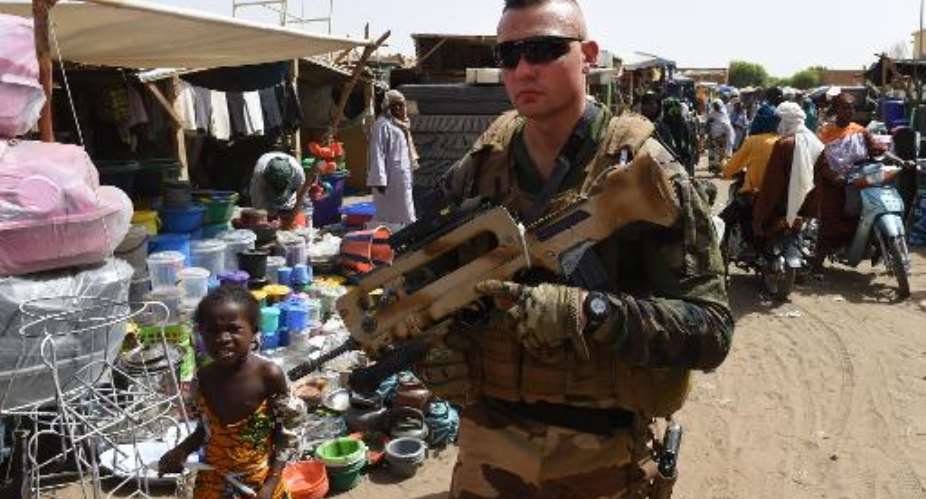Gao (Mali) (AFP) - They were sleeping out in the open along the banks of the river Niger to escape the stifling summer heat when a rocket fired at a nearby UN base sent the vegetable growers of Gao and their families running for cover.
Dawn was about to break in northern Mali's main city when the Islamists attacked. "Everyone woke up and ran towards the houses, children crying," said Mohamedou Sekou Maida, 39.
The father of nine ekes out a living growing lettuce and melons on a small patch of red earth irrigated by a pump given to him by the French army.
"Since then we dare not go down to the river to sleep at night despite the heat. We stay inside, on the alert," he said as he watered his mango trees.
"These kind of attacks don't happen often -- once or twice a month -- but that's enough to frighten people. The idiots doing this don't give a damn about Mali. All they want to do is destroy."
The rocket fired at the UN early on Friday hit the wall of the base but caused no injuries. It came from a plateau overlooking the town from which previous attacks have also been launched.
In the nearby French military camp soldiers from the anti-jihadist Operation Barkhane were woken by a siren which sent them scurrying to their dug-outs until the alert was lifted an hour later.
The attack was claimed Sunday by Al-Qaeda in the Islamic Maghreb (AQIM).
The jihadists were chased from Gao by the French in January 2013 after they and Tuareg groups overran the desert north of the sprawling country and threatened to take the capital Bamako.
Malian and United Nations troops now patrol the town, but they can also call on French forces based at the airport for back-up if the need arises.
"Which means in the city everything is OK... mostly," said the manager of its market, Amadou Al-Hassan. "The bandits know if they come into Gao they won't get out alive. So sometimes they fire rockets from far away, like the other day. The problem is outside the town," he said.
- Two Arabs lynched -
On Saturday the market, rebuilt after it was burnt down in the 2013 fighting, was crowded with shoppers, its stalls along the river filled with fruit and vegetables from the area and local staples like dried fish.
But there is almost nothing on sale that has come from outside the area.
"People are afraid to go out of Gao, even to go a few kilometres," said Al-Hassan. "The traders who brought merchandise up from Bamako have stopped or fled. There is no security. Armed bandits can block the roads and you never who they are."
A climate of fear and tension reigns, with every stranger viewed as suspect, said Issouf Maiga of Naata (Hope) radio, one of 14 local stations in the city.
"There are roadside bombs and machine-gun fire sometimes. I myself am afraid. I am afraid for my mother in particular. Every Tuesday she goes out of town to a market. I cry at the thought of her not coming back, it would end my life," he said.
A brutal demonstration of the paranoia gripping the city was the lynching of two Arab miners in Gao on March 7 after an Islamist attack on Bamako. They were hanged and their bodies burned by a mob which took them for terrorists trying to plant bombs, when in fact they came from a pro-government family hostile to the rebels.
"The problem with us blacks," he said, referring to black Africans who predominate in the more fertile south of the country, "is that we can't tell the difference at first sight between a Tamashek (Tuareg) and an Arab. So we are afraid of everybody and anybody we don't know.
"People who worked with the jihadists bandits when they occupied the city, we know who they are, so they can't come back. But the others, we don't know... So the whole population is afraid."
Maiga said only a peace deal between Bamako and the mostly Tuareg rebels can end unrest and insecurity.
"As long as there is no unity in Mali, armed bandits will exploit the situation, and we will live permanently in danger and confusion," he said. "If we were united, they (the jihadists) would have to clear out of Mali," he added.





 Avoid pre-registered SIMs, buyer and seller liable for prosecution – Ursula Owus...
Avoid pre-registered SIMs, buyer and seller liable for prosecution – Ursula Owus...
 Election 2024: Mahama has nothing new to offer Ghanaians, Bawumia is the future ...
Election 2024: Mahama has nothing new to offer Ghanaians, Bawumia is the future ...
 OSP files fresh charges against ex- PPA Boss
OSP files fresh charges against ex- PPA Boss
 Withdraw unreasonable GH¢5.8m fine against former board members – ECG tells PURC
Withdraw unreasonable GH¢5.8m fine against former board members – ECG tells PURC
 Akroma mine attack: Over 20 armed robbers injure workers, steal gold at Esaase
Akroma mine attack: Over 20 armed robbers injure workers, steal gold at Esaase
 Those who understand me have embraced hope for the future — Cheddar
Those who understand me have embraced hope for the future — Cheddar
 Ghana will make maiden voyage into space should Bawumia become President — Chair...
Ghana will make maiden voyage into space should Bawumia become President — Chair...
 Train crash: Despite the sabotage, we shall not be deterred and will persevere —...
Train crash: Despite the sabotage, we shall not be deterred and will persevere —...
 Tema-Mpakadan railway project a perversion of the original viable concept design...
Tema-Mpakadan railway project a perversion of the original viable concept design...
 Train crash: Elsewhere, everyone involved in the test will either be fired or re...
Train crash: Elsewhere, everyone involved in the test will either be fired or re...
